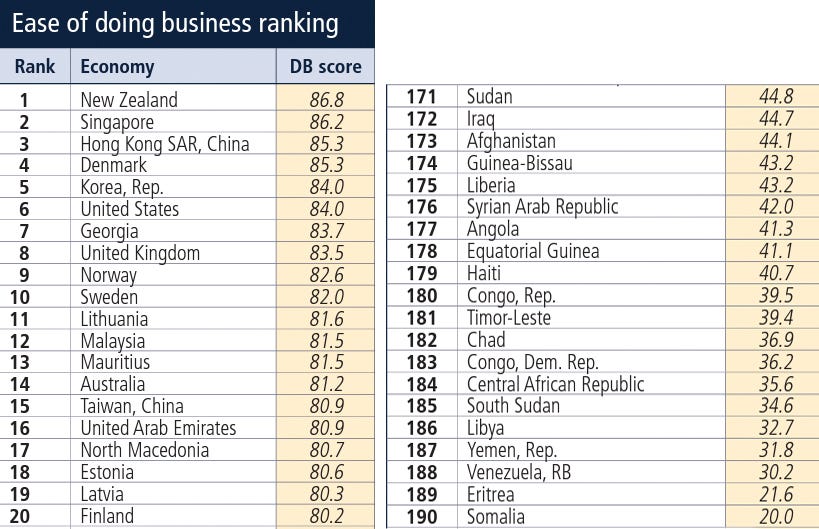The Real Reason Africa Is Still Chained
African Prosperity Requires Better Business Environments
Let me tell you what it’s like to do business in many parts of Africa.
Imagine that you’ve decided to start a legal business in Burundi. You’ve made your way back and forth across town in congested traffic dozens of times, waited in endless lines, and greased bureaucrats’ palms—just to get through the preliminary procedures of getting your business license.
It’s taken 5 days, and cost you 12.3% of your annual salary. Your family has had to cut corners, not just on entertainment, but on necessities like groceries, childcare, school fees, and transportation. You’re sleep-deprived, furious, and terrified, because you know that, at any point, the whole thing could fall through.
If that doesn’t sound insane to you, let’s put it into perspective.
If you had started that exact same business in New Zealand, the whole process would have taken 4 hours (30x less), and it would cost you just .2% of your annual income (60x less)—leaving you and your family with money to live your lives.

I used to wonder why Africans would climb into overcrowded boats and die at the bottom of the ocean.
I used to wonder why our people would be willing to risk freezing to death in the baggage compartments of planes.
I used to wonder why we would risk being trapped and sold as slaves when we try to illegally cross borders.
Faced with the option of starving at home, or having the chance to make something of themselves in Europe, these brave entrepreneurs choose the latter. Even if it cost them their lives.
It doesn’t take a genius to figure out that when countries make it hard to do business, less business gets done. And the most valuable people—the founders, innovators, and business owners—won’t want to stick around.
Don’t believe me? Take a look at the World Bank’s Doing Business (DB) index. Only a handful of African nations fall in the top half, but fourteen African countries fall within the bottom twenty.

Africa’s poverty is directly connected to its high concentration of awful business environments.
This connection is so obvious that I was first surprised, then outraged, that no one brings it up—especially not people in the West who claim to care about African poverty.
If it is almost impossible to do business in so many African nations, how are we supposed to create companies, hire employees, and grow?
Why would a company relocate operations from, say, Singapore or the Bahamas, to invest in Senegal if all they’re going to find are massive headaches?
While we can quibble about the details, one thing remains clear:
If we want to generate prosperity in Africa, we cannot ignore the need for better business environments. We need fewer—WAY fewer—government obstacles to business activity.
We need leaders who will say, “I’m going to make it as easy as possible for you to build new companies and hire and fire as the business requires.”
Africa has incredible mineral wealth and land wealth. We should be mind-blowingly rich. But we aren’t. And the reason is simple:
We are still chained.
But we can change this reality. We can free ourselves from the regulatory regimes that have held Africa back for generations. We can embrace policies that will help entrepreneurs create opportunities, jobs, and prosperity.
Let’s take off the chains. Let’s prosper. Let’s do business freely.




Very impactful and an inspirational call to action.